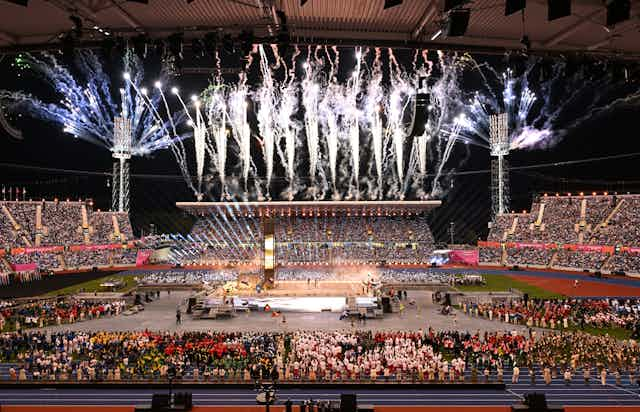Premier Daniel Andrews announced on Tuesday that the Victorian government has withdrawn from its commitment to host the 2026 Commonwealth Games, citing an anticipated cost blowout from an original estimate of A$2.6 billion to over $6-$7 billion.
Commonwealth Games Australia chief executive Craig Phillips described the decision as “beyond disappointing”. Phillips questions the government’s figures, saying that the cost of running the Gold Coast event in 2018 was $1.2 billion and the 2022 Birmingham Games was $1.8 billion.
The government said existing funding set aside for the games will remain invested in regional projects intended to create an event “legacy”.
Aside from the viability of the 2026 event, Victoria pulling out of hosting the event raises the broader question of whether the Commonwealth Games will survive.
How has this happened?
Victoria secured the Commonwealth Games in April 2022 with a unique multi-region model that sought to bring the event to regional Victoria.
Despite the obvious risks and costs associated with decentralising a major event away from pre-existing infrastructure in Melbourne, Andrews noted at bid submission that
Victoria is Australia’s sporting state, and, if awarded the 2026 Commonwealth Games would demonstrate to the world a new way to deliver the competition.
Andrews made clear the decision to withdraw was entirely financial, stating that the new estimated cost of potentially over $7 billion “does not represent value for money”.

When pressed at his media conference to provide accountability as to how his government’s costing could have been so grossly inaccurate, Andrews said that certain event costs were unforeseeable.
What could not be reasonably foreseen, and was not foreseen, was the costs incurred in terms of services, security, transport […] there were estimates that were made and those estimates are clearly well and truly under the actual cost.
The Commonwealth Games Federation and Commonwealth Games Australia dispute these costs estimates. They signalled the blame for any cost overruns lies with the Victorian government.
The numbers quoted to us today of $6 billion are 50% more than those advised to the Organising Committee board at its meeting in June.
Since awarding Victoria the Games, the Government has made decisions to include more sports and an additional regional hub, and changed plans for venues, all of which have added considerable expense, often against the advice of the Commonwealth Games Federation and Commonwealth Games Australia.
The implications
The decision to withdraw from hosting the event will still incur costs. This includes pre-existing costs related to staffing contracts, renting premises and marketing, as well as to-be-determined contractual break costs as negotiated with the Commonwealth Games Federation.
The financial costs of the withdrawal, however, may pale against the longer-term reputational damage done to Victoria and perhaps Australia more broadly.
This decision may also damage Andrews’ reputation. In proposing an untested regional games delivery model, it was incumbent on the government to adopt a particularly rigorous process to ensure the the event’s viability, which does not appear to have been done.
Is Victoria still Australia’s ‘sporting capital’?
Victoria has long proclaimed itself Australia’s (and even the world’s) sporting capital. The state has developed an unparalleled portfolio of major sport events since the 1980s, and become a global exemplar in executing major events in the process.
But withdrawing from the 2026 Commonwealth Games arguably represents Australia’s most prominent sporting failure of the past half-century, and is a significant reputational blow to Victoria’s sporting pre-eminence.
Read more: For cities, hosting major sporting events is a double-edged sword
What’s more, in an annual global ranking of sport cities published last month, before the Commonwealth Games decision, Brisbane (15th) leapfrogged Melbourne (23rd) and Sydney (44th) to become Australia’s top ranked.
Brisbane’s success isn’t only attributable to its impending hosting of the 2032 Olympics. Its ranking also recognises that the FIFA Women’s World Cup is being played predominantly in the north-east Australian states due to stadium challenges associated with AFL-orientated Victoria.
Meanwhile, South Australia’s recent sporting successes include the hosting of AFL Gather Round, LIV Golf and recent procurement of the 2024 Super Netball final from Victoria.
Victoria’s grip on the “sports capital” title is increasingly tenuous.
The end of the Commonwealth Games?
Perhaps the most critical question is the viability not only of the 2026 Games, but also the broader Commonwealth Games movement.
Victoria’s withdrawal continues a trend of recent instability. In 2017, the South African city of Durban was stripped of 2022 hosting rights for a failure to meet key obligations around governance, venues and funding.
However, whereas the Commonwealth Games Federation had just under 2,000 days to secure a replacement host for 2022, Victoria’s withdrawal has occurred only 973 days prior to the start of the event.
Read more: Major sports events: are they worth it?
The movement’s broader existence is perilous given there’s a shrinking pool of host cities. Victoria was the only formal applicant for the 2026 edition.
This is a challenge faced by large sporting events more broadly, with potential applicants increasingly wary of the significant costs.
Even the summer and winter Olympic Games have increasingly struggled to attract applicants. This resulted in the unprecedented move to simultaneously award the 2024 and 2028 summer games to Paris and Los Angeles in 2017 – normally the summer games are awarded to one city at a time.
With seemingly little global appetite to host the event, and broader cultural discussions in Australia and abroad surrounding the role of the monarchy, existential questions surround the Commonwealth Games movement.

